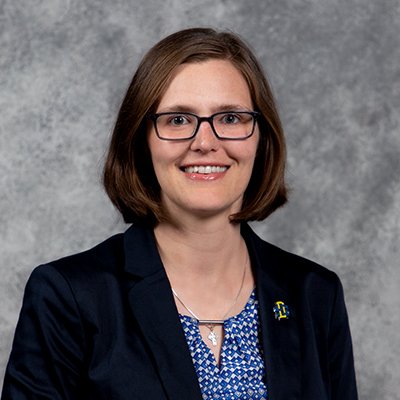
Why did you decide to become a nurse? It might sound cliche, but I loved that nursing combined science and art. I was a strong student, especially in math and science. I wanted a job where I could use those strengths and interact with people. My high school anatomy teacher talked about her sister, a nurse, in class. She said she admired her sister’s brilliance and the way she translated science into patient care, and just like that, I knew it was for me.
What drew you to become a nurse educator? I had a strong desire to go to grad school and expand my ability to impact the nursing profession and the health of the community. I was encouraged by my colleagues at that time to consider education since I was so enthusiastic about educating others at our facility. I was always eager to orient and mentor the new RNs or take time to talk with CNA students. The more I thought about it, the more I realized I was passionate about education. I wanted to help nursing students find their passion and gain an appreciation for the unique perspective of the nursing profession. I wanted to help future nurses feel informed and inspired so they could be advocates for their clients.
How has your nurse educator certification helped you in your faculty role? Being a certified nurse educator has made me a stronger and more confident instructor. The process of preparing for the exam helped me to really dig in and remember the big picture of the curriculum. I learned about curriculum development during my master’s program, but there’s something about preparing for an exam and passing an exam, that helps to solidify what you know. Having that perspective of the big picture helps me to plan more meaningful and intentional teaching and learning activities. I feel like it makes me more flexible and resilient. I may encounter technical glitches during the lesson (because who doesn’t), but because my focus is on the stepping stones of learning that are our objectives, I can adjust. My ultimate goal for each lesson is that learning takes place. Being certified has equipped me to be more confident in making decisions to support learning even if they are new or different.
What is one of your greatest accomplishments? It’s hard to pick one, but I am really proud of my master’s thesis. It was my first foray into research and cemented a PhD as my goal. But also, I gave birth to my first daughter in the middle of my master’s degree, just prior to starting my thesis work. So, I felt so accomplished to have it done while also adjusting to life as a new mom. I was so proud to have it bound and posted on Open Prairie. Every time I get an updated about people accessing and downloading my thesis, I am reminded of how hard I worked to get that done.
What is a fun fact about yourself? I have a long history of Dutch dancing. I started Dutch dancing in fifth grade, started participating in a touring group when I was in 9th grade, and in my senior year I taught Dutch dancing to like 150 kids. For context, I grew up in Pella, Iowa, which is a community in southern Iowa known for its Dutch heritage and tulip festival. I can’t go home for Tulip Time most years because it’s finals week here at SDSU, but I do play my Dutch dancing music in my office during the first week of May.
What you'd like students to know: tips and advice. There is so much could say, but the thing that comes to mind is to approach your nursing studies with an open mind. Nursing is a lot more complex than a lot of people realize. It’s more than the hands-on assessments and skills that people see, it’s also thinking critically, serving as an advocate, demonstrating compassion, and communicating effectively. Sometimes it can be hard for students to appreciate the value of these less tangible skills until they are a little further along in the program. Sometimes your instructors will use some unexpected teaching and learning strategies to help you develop those skills. So, try to be open to the experience.
Sometimes it’s hard to see why we are doing what we are doing or why we are asking you to do what we are asking you to do. I know that sometimes it seems like you aren’t making the progress you think you need to make, but there is a plan. Our curriculum is mapped out to get them to the end goals of passing the NCLEX and providing great patient care. We have a lot of great instructors that help take that curriculum map and translate it to intentional course and lesson objectives. Our lesson plans are then designed to align with those objectives. So, we plan our lessons to not only prepare you for the next exam but to give you the foundation you will need for the tasks yet to come.
I like to compare it to the times we sometimes have to ask our clients to trust us when we ask them to endure a painful procedure or complete a challenging therapy session. We tell them that we have a plan to help them move forward toward their larger goals and to trust us that we are helping them head in the right direction.

